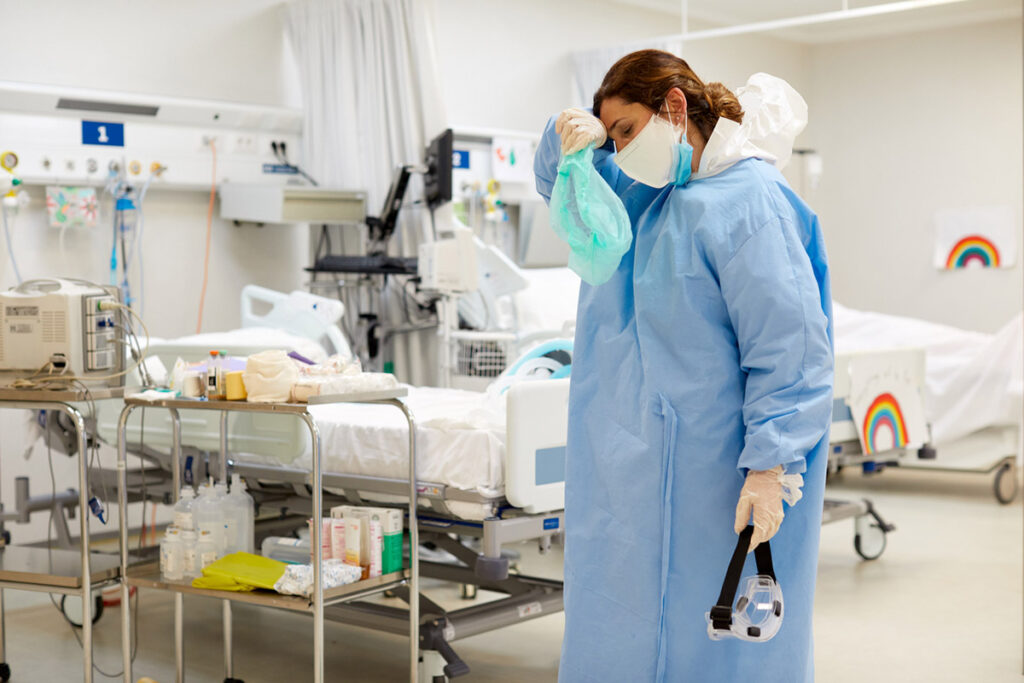Most of us think of hospitals as safe havens, where our illnesses and problems will be handled with care. But for most healthcare workers, going to work can be a matter of life and death. Physicians, nurses, and healthcare workers feel the pressure and consequences of sickness more than most; but how exactly has the pandemic impacted them and why should their wellbeing be a top priority moving forward? This article will explore the challenges faced by healthcare workers today; including severe stress, burnout, and even violence in the workplace.
Healthcare Workers And Pandemic-Related Stress
You have probably noticed that stress makes you feel tired, helpless, and even sick. This is because stress suppresses your immune system, and can even leave you at a higher risk for a heart attack or stroke. During the pandemic, the entire nation has been experiencing heightened levels of stress and physicians are no exception. According to the American Hospital Association 2022 Healthcare Talent Scan physicians report feeling the following stressors:
- Moral stress: Imagine having a job that requires you to face life and death consequences daily. Many physicians report feeling powerless to save their patients during the COVID-19 pandemic and feel guilt for possibly infecting others or being a hazard to loved ones.
- Staffing Stress: Staffing gaps and working longer hours than usual lead to burnout and a lack of communication amongst healthcare workers.
- Workplace Disruption Stress: At this point, the majority of us know what it is like to self-isolate. Physicians also felt quarantine-related stress acutely, as they were not able to receive peer-to-peer support and share their feelings easily with their colleagues.
Why Should We Care? Healthcare workers make our healthcare system function, and the stressors they are currently experiencing could lead to serious long-term harm. If action is not taken to support health care providers, they may make medical errors on the job, experience depression, and have trouble with their interpersonal and familiar relationships.
Healthcare Workers And Stress: Who Is Impacted Most?
Female Physicians And Covid Stress: According to recent reports, female physicians experience more burnout and stress when compared with male healthcare workers. Female healthcare workers typically feel more pressure when it comes to childcare and family responsibilities.
- Providing childcare support for healthcare workers can help them feel less pressure and concentrate on their mental health and work responsibilities.
How Can Hospitals Reduce Stress? Encouraging healthcare workers and physicians to speak openly about their stressors and concerns at work and home could help reduce mental burnout and increase overall wellbeing. Anonymous-reporting practices are an essential part of increasing healthcare wellbeing and reducing mental health prejudices.
Healthcare Workers And Violence On The Job
Violence In The Emergency Room: Many healthcare workers consider violence an inescapable part of the job. At the Cleveland Emergency Department, thousands of weapons are confiscated at the entrance door each year. In an interview with NPR, the clinic’s CEO stated that “there is a very fundamental problem in U.S. health care that very few people speak about…and that’s the violence against health care workers. Daily we are exposed to violent outbursts, in particular in emergency rooms.”
- According to the U.S Bureau of Labor Statistics, health care workers are five times more likely to experience workplace violence compared to other workers.
- Studies show that close to 50% of emergency physicians have been assaulted at work, and 70% of emergency nurses report being physically hurt.
- The resulting trauma can lead to burnout, turnover, and a lower quality of patient care.
Healthcare worker abuse isn’t just physical. Reports have shown that even professional colleagues and supervisors can verbally abuse their team members. Many times, however, the physical and verbal abuse comes from patients or families of the patients who are experiencing loss.
In November 2019, the U.S. House of Representatives passed the Workplace Violence Prevention for Health Care and Social Service Workers Act, which requires employers to investigate violent incidents and provide defensive training to employees. While the bill has not yet passed the Senate, it is a step forward in the right direction.
How to Protect Health Care Workers
To combat both overt and passive aggression in the workplace, hospitals need to create a no-tolerance violence policy and a system where healthcare workers can voice and file their complaints, whether it be against a patient or a colleague. Peer-to-peer support groups, 24/7chat lines, and mental health workshops are just a few ways hospitals can make the workplace safer for their employees. What are your thoughts about preventing violence and severe stress in hospitals? Do you think healthcare workers deserve more help? Share your thoughts, feelings, and comments below, because together, we learn.

